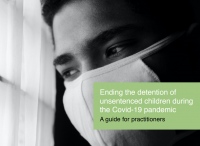UK: Ending the Detention of Unsentenced Children during the COVID-19 Pandemic
18th May 2020
 The Howard League for Penal Reform has produced guidance for legal practitioners on how to keep unsentenced children out of pre-trial detention. Custody is a damaging environment for children in normal times, but due to the COVID-19 pandemic, conditions in custody have worsened for imprisoned children, with the severely restricted regime meaning that most children are in prolonged solitary confinement, with no face-to-face visits, very little face-to-face education, no therapy and little support for planning for release.
The Howard League for Penal Reform has produced guidance for legal practitioners on how to keep unsentenced children out of pre-trial detention. Custody is a damaging environment for children in normal times, but due to the COVID-19 pandemic, conditions in custody have worsened for imprisoned children, with the severely restricted regime meaning that most children are in prolonged solitary confinement, with no face-to-face visits, very little face-to-face education, no therapy and little support for planning for release.
This is particularly worrying for children on remand given the current delays to trials, especially as the majority of children remanded do not receive a custodial sentence. Despite this, in March 2020 34% of children in the youth secure estate were on remand.
The guide recommends that practitioners encourage judges to make any decision to remand a child subject to ‘anxious scrutiny’ due to the pandemic, so that no child is remanded except in exceptional circumstances. This is in line with both domestic and international principles that stipulate that the welfare or best interests of the child should be at the forefront of court decisions concerning children. Already the courts in England have taken into account the COVID-19 pandemic when making sentencing decisions for adults, creating precedent for the same approach to be taken for children.
The statutory right to bail applies for the majority of those charged, unless the court is worried that the person may fail to surrender to custody, may commit an offence, or may obstruct the course of justice on bail. The guide suggests that the likelihood of children committing offences while on bail is low due to the current lockdown restrictions, and there are unlikely to be sufficient grounds to refuse bail on the basis of the child’s welfare given the current conditions in prisons.
If bail is refused, the court can only consider remand in youth detention accommodation under certain conditions, and even then the court has discretion as to whether to remand the child there or not. The guide recommends that practitioners argue that the secure estate is unable to meet children’s welfare needs due to the pandemic restrictions, and that therefore the court should exercise its discretion and remand to local authority accommodation rather than youth detention accommodation. It suggests that circumstances such as the general public health emergency, the postponement of trials (meaning that children on remand could be detained indefinitely and potentially for longer than any sentence they could have been given), the traumatic effect of children being detained while concerned about the safety of their families during the pandemic, the lack of adequate provision of education in the secure estate due to the restrictions and the heightened risk of infection in places of detention could all be potential grounds for a repeat application for bail. It is also suggested that practitioners work with the Youth Offending Team to ensure children have accommodation where they can stay while on bail, to ensure children are not remanded due to lack of accommodation.
This guidance document follows the publication of a briefing on children in prison during the COVID-19 pandemic by the Howard League a month earlier.
The full guide for practitioners can be read here.
Related items:
- Children's Ombudsman calls to extend youth justice sanctions to adults under 24
- RTÉ Prime Time: Young people who offend
- The Detail: Care home shortages force scores of children to stay in juvenile detention
- IPRT presented at the Youth Diversion Project Conference
- Prison Overcrowding Response Group report




